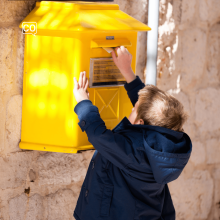Mandar (to send) - Pretérito imperfecto, indicativo (Imperfect Past, indicative) - Spanish

Mandar - Conjugation of to send in Spanish: Conjugation table, examples and exercises in the imperfect past, indicative tense (Pretérito imperfecto, indicativo).
Pretérito imperfecto, indicativo (Imperfect Past, indicative)
All conjugations and tenses: Mandar (to send) - conjugation and tenses - (Spanish)
Syllabus: Spanish lesson - Hacer un intercambio (Going on an exchange)
Conjugation of to send in Pretérito imperfecto
- yo mandaba I was sending
- tú mandabas You used to send
- él/ella mandaba he/she sent
- nosotros/nosotras mandábamos we sent
- vosotros/vosotras mandabais You sent
- ellos/ellas mandaban they sent
Example phrases
- Cuando trabajaba en la granja, mandaba a los perros que vigilaran las ovejas. When I worked on the farm, I sent the dogs to watch the sheep.
- Cuando eras niño, mandabas cartas a tus amigos cada verano desde la playa. When you were a child, you sent letters to your friends every summer from the beach.
- Juan siempre mandaba flores a su abuela cuando estaba enferma. He always sent flowers to his grandmother when she was ill.
- Cuando vivíamos en el campo, mandábamos a nuestros hermanos a recoger leña del bosque. When we lived in the countryside, we sent our brothers to collect firewood from the forest.
- De pequeños, mandabais mensajes secretos a través de la página web. When you were little, you were sending secret messages through the website.
- Mientras estaban en la ciudad, mandaban cartas a sus padres describiendo el viaje. They were sending letters to their parents describing the trip while they were in the city.
Exercise: Conjugate the verbs - mandar (to send)
Instruction: Choose the correct word, read the sentence out loud and translate.
Show answers Show translationMandar (Pretérito imperfecto, indicativo)
1. De pequeños, ... mensajes secretos a través de la página web.
2. Cuando eras niño, ... cartas a tus amigos cada verano desde la playa.
3. Mientras estaban en la ciudad, ... cartas a sus padres describiendo el viaje.
4. Juan siempre ... flores a su abuela cuando estaba enferma.
5. Cuando vivíamos en el campo, ... a nuestros hermanos a recoger leña del bosque.
6. Cuando trabajaba en la granja, ... a los perros que vigilaran las ovejas.